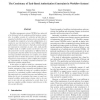276 search results - page 23 / 56 » Role Organization Model in Hozo |
JBI
2006
13 years 7 months ago
2006
Molecular evolutionary studies provide a means of investigating how cells function and how organisms adapt to their environment. The products of evolutionary studies provide medic...
AICT
2006
IEEE
14 years 1 months ago
2006
IEEE
Spoken language education plays an important role in modern language courses. Computer-based spoken language test systems provide a convenient, efficient and reliable approach to ...
BIOSYSTEMS
2008
13 years 7 months ago
2008
This paper aims to offer an overview of the meaning of autonomy for biological individuals and artificial models rooted in a specific perspective that pays attention to the histor...
COMAD
2008
13 years 9 months ago
2008
In designing and developing large complex products, people use models to describe and organize interrelated elements in both product systems (architecture, use cases, constraints....
CSFW
2004
IEEE
13 years 11 months ago
2004
IEEE
Workflow management systems (WFMSs) have attracted a lot of interest both in academia and the business community. A workflow consists of a collection of tasks that are organized t...

